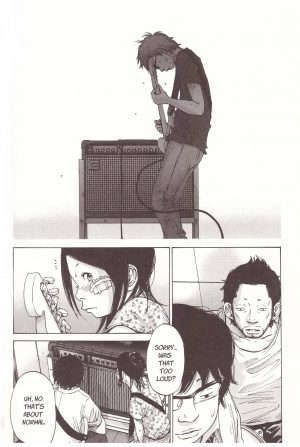Review by Frank Plowright
A slice of life graphic novel set in the real world is uncommon for Japanese genres translated into English, but is somewhat the speciality for the reflective Inio Asano who’s dealt with the work/life balance and coming of age in other projects. Solanin’s variation on the theme is the idea of how long anyone has to fulfil their dreams before the realities of life take precedence.
It’s nice to see a back cover blurb that intrigues while not revealing anything more than we’re told over the first few pages. Although Solanin comes to involve other people, the central figure to begin with is office worker Meiko Inoue. She’s sick of her job, so quits, figuring her savings will see her through for a year, even accounting for Taneda, the boyfriend she lives with. It’s almost an impulse decision, but she’s generally grounded, which doesn’t apply to Taneda, who believes he should get his band back together and give success one last shot. Asano spends a considerable time rolling through the cast, amounting to five significant people, introducing us to their thoughts and feelings in short chapters. It’s at just about the point where he seems to be drifting that he drops the bombshell. It’s a clever device, prefaced by an audience-fooling piece of stagecraft.
Asano’s artistic preference elsewhere has been for incredibly time-consuming photorealistic detail, but a character-based story sees him simplify his style. Nevertheless, by the standards of much manga he’s very conscientious, providing backgrounds, lovely little pictures of urban scenes and individual cast portraits separating the chapters, and pouring personality into that cast. He also achieves the very difficult process of conveying live music on static pages, a section toward the end phenomenal in seeming as though his technique of separating panels with large blocks of black featuring white text has been leading up to that moment.
There’s a leap forward midway through, with Meiko now in a new dead end job, but reconsidering her priorities. The certainties of before have been erased, her life has become one of introspection, and the subtleties of what Asano’s already shown us come home to roost. Other cast members also have cause to consider their lives and what really matters, and they come to some interesting conclusions. Strangely, though, it’s Meiko who seems the most lost, yet redefines her friends. Redefinition, by the way, is another theme, especially nicely handled when applied to the song providing Asano’s title.
Much is noted in passing, only to for Asano to return to a scene or echo it much later, making this a book best read in a single sitting if possible, even at over 400 pages. Reading messages into Solanin is comparatively easy, but assessing how many of them are intended as a call to arms from Asano isn’t as straightforward. Perhaps the abiding message is that life can only be shaped up to point. This is a sentimental journey in the best way, extremely considered without being over-thought featuring a cast at a crossroads designed to be loved. Pick the schlockiest American coming of age movie and imagine the cast and process given the attention to supply an Oscar winner. It imbues a sense of importance to the everyday because for most people the everyday is important, even if they don’t always realise it at the time. Hindsight is needed to filter the pleasures, and that’s what Solanin supplies with considerable observation, subtlety and charm.





